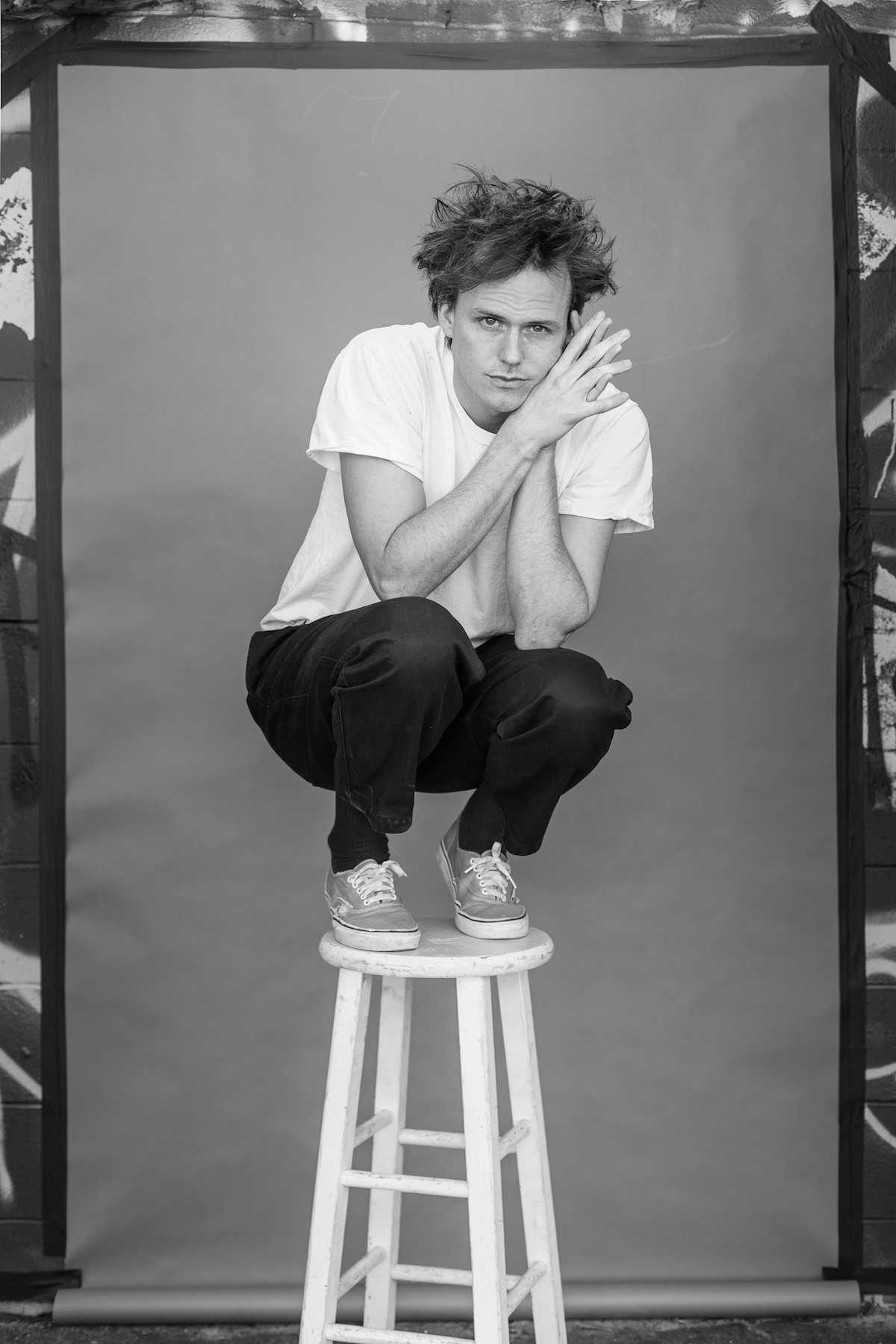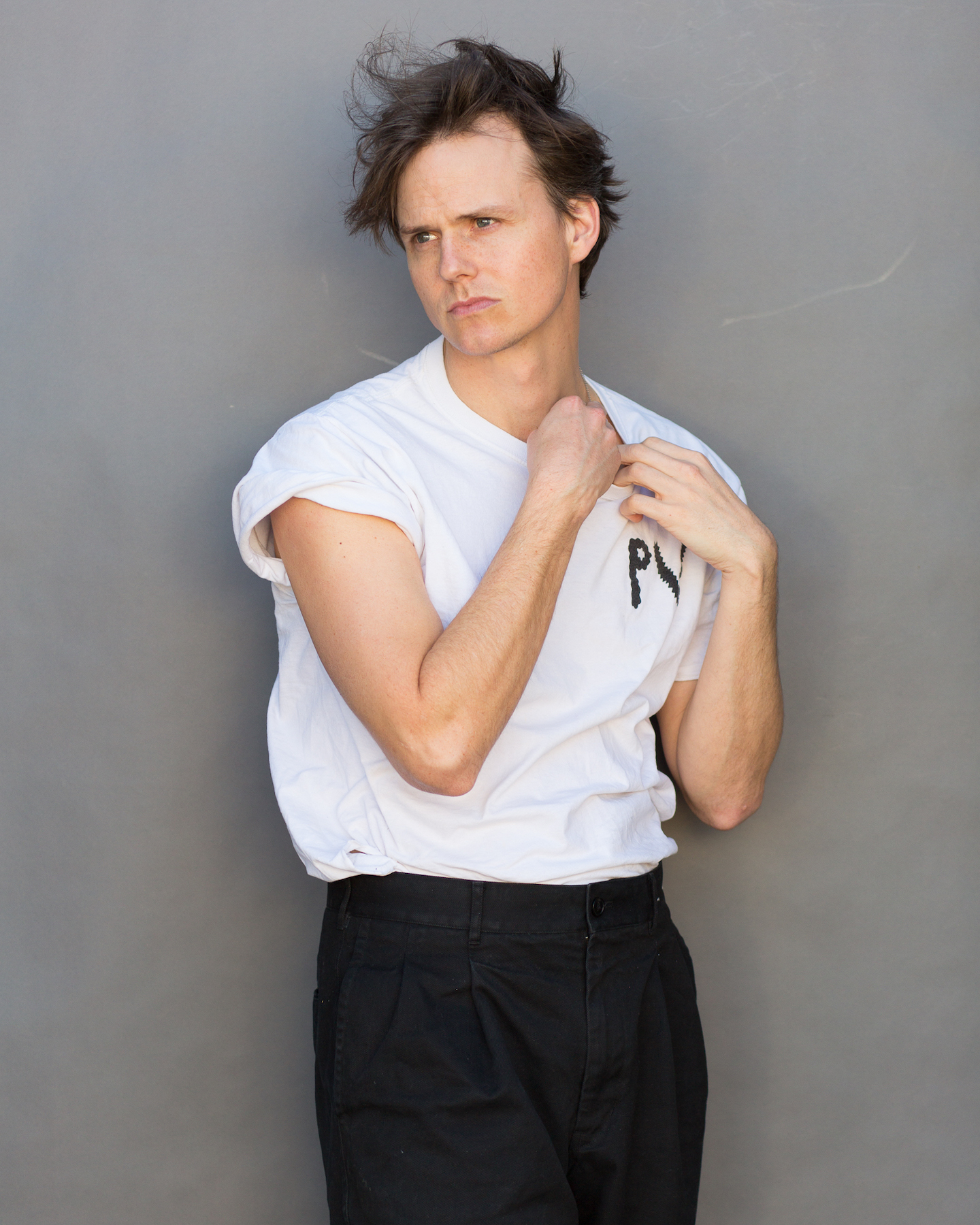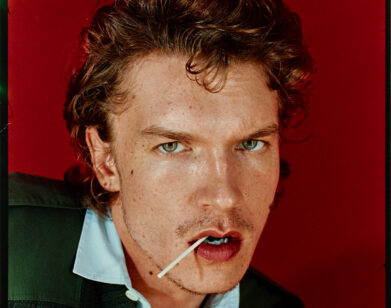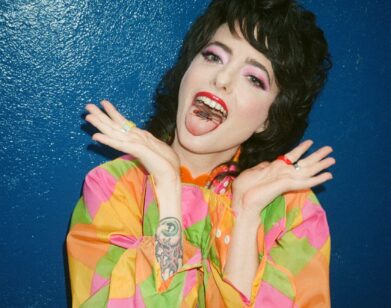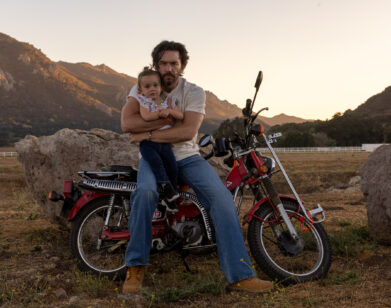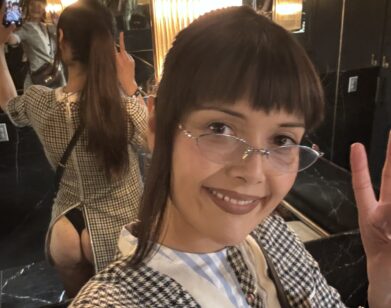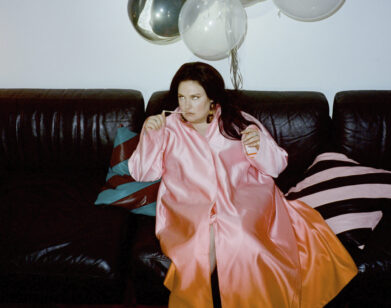Whitmer Thomas Talks to His Emo Idol Mark Hoppus About Mining Tragedy for Comedy
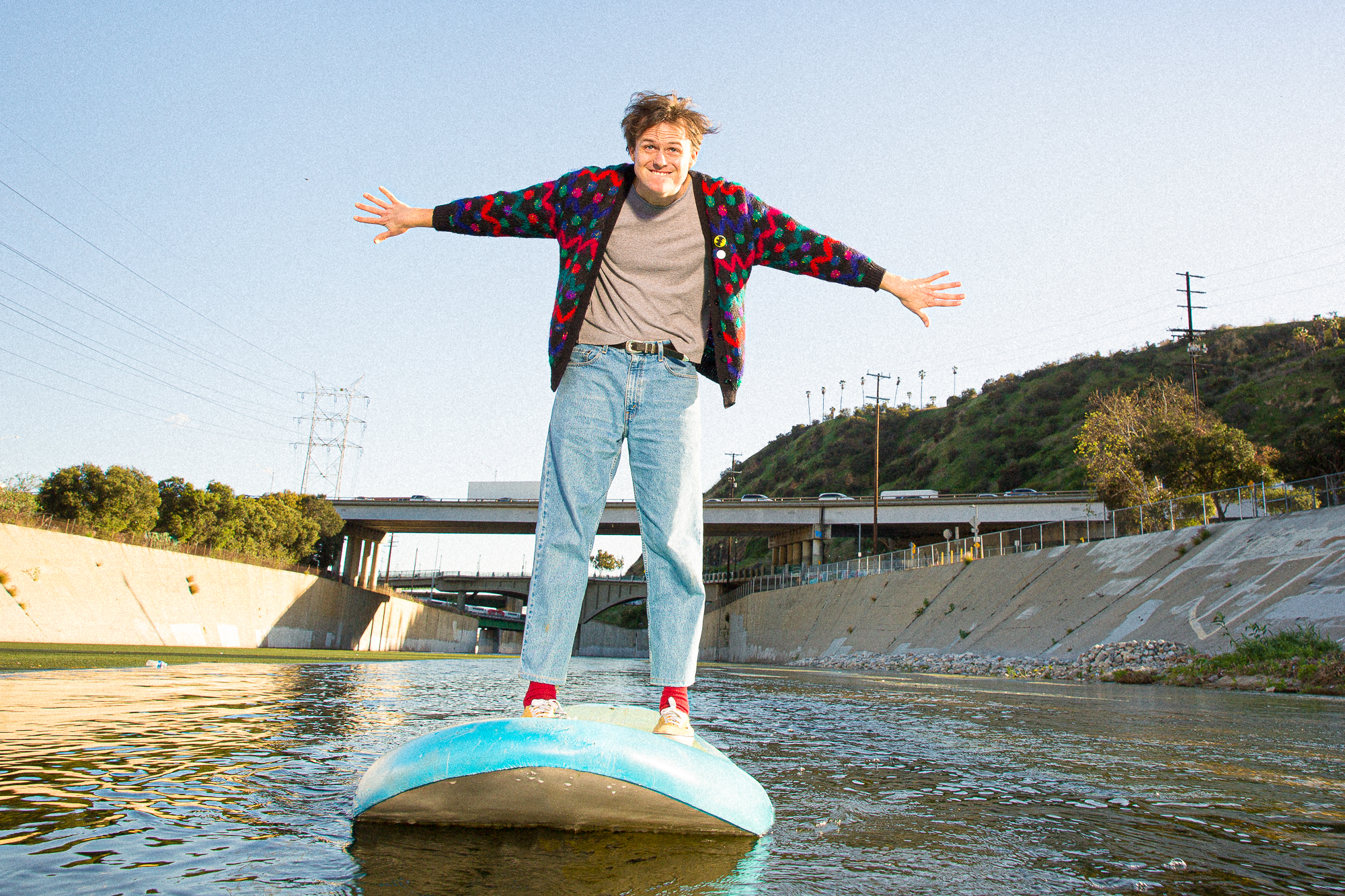
Earlier this year, Whitmer Thomas crossed the rubicon every young comedian strives for. After years of grinding it out in Los Angeles and New York’s comedy club circuits, the 30-year-old Alabama native released his very own HBO special, The Golden One, in February. A disarming blend of music, comedy, and personal documentary, the hour-long special is an often funny, sometimes sad, and always engaging excavation of his personal history and hangups, with the traumatic loss of his mother functioning as its beating heart. Thomas’s mother, a musician whose success never equaled her ambition, passed away from alcoholism shortly after Thomas moved to L.A. to pursue a career in show business when he was just 18 years old. The trauma led him to shun alcohol and drugs for most of his adult life, which Thomas addresses in the song “Partied to Death,” the show’s cathartic highlight.
Filmed at the Flora-Bama Lounge, the Pensacola bar where his mother performed with her twin sister as Syn Twister, and directed by his best friend and longtime collaborator Clay Tatum, Thomas fills the special with tales that border on the horrific, like the time Thomas’s dad saved him from being abducted by a stranger. But through a warm delivery and non-threatening approach, Thomas manages to walk the line between tragedy and comedy with grace. Having honed his craft as a member of the skate-punk comedy group Power Violence, Thomas, who self-identifies as an “aging emo kid,” grew up idolizing Blink-182, which he once called “the ultimate parody band.” It made sense, then, to connect him with Blink bassist and vocalist Mark Hoppus, for a conversation about comedy, creative catharsis, and finally making it. —BEN BARNA
———
WHITMER THOMAS: Hey, buddy! How are you doing?
MARK HOPPUS: Good. Where are you?
THOMAS: In my house, just not leaving. How about you?
HOPPUS: I’m in my house, not leaving. Who’s in your circle of quarantine right now?
THOMAS: My girlfriend and my roommate.
HOPPUS: Your girlfriend that likes to do cocaine and dance?
THOMAS: No, we broke up a long time ago.
HOPPUS: Oh, okay.
THOMAS: That was when I was young.
HOPPUS: How long have you been indoors for?
THOMAS: A week. I feel like it’s a good opportunity to sit around and make music.
HOPPUS: What else are you doing?
THOMAS: I finished working on a script. And then trying to make videos. I’m trying to become a social media whiz kid.
HOPPUS: What comedian did you grow up liking?
THOMAS: When I got cool, I started to really like Zach Galifianakis and Maria Bamford and Tig Notaro. But when I was a kid, it was Eddie Murphy and Adam Sandler and Jim Carrey. Those were my guys. But really, the first comedy record, and I’m not the only comedian who I’ve heard say this, is y’all’s live record. Y’all dicking around in between those songs.
HOPPUS: That’s funny because we never wrote any of that stuff. Tom [DeLonge] and I would always try and figure out who could say the most upsetting thing on stage. And then we did a whole tour of that and put it together on the live album.
THOMAS: If y’all would’ve filmed it, it could’ve been the best comedy special of all time.
HOPPUS: We should’ve done that. Damn. What was more important to you growing up? Comedy, skateboarding, or music?
THOMAS: Probably music, because I was always injured from skateboarding. I started off playing bass. But when I broke my wrist the second time, I lost my ability to properly strum the bass. We had taken our band so seriously all throughout high school that once we got to be seniors and started to actually think about shit, we decided that maybe we didn’t want to do the band anymore. Me and my friend Clay had gotten into making little stupid videos, and we thought, “Maybe we should do that instead.”
HOPPUS: Talk to me about your friendship with Clay and how that evolved.
THOMAS: We met when we were 10, and we liked all the same shit. We liked punk music and skateboarding and we loved making things. We would start a new band every two weeks, a teen pop punk or gutter punk or hardcore or ska. Finally, we got into a more serious emo band. And then we both started getting into movies at the same time in high school. And then Clay got a scholarship to film school, and I moved with Clay to L.A. We were always the most serious ones out of our friends, too, when it came to the stuff that we were making.
HOPPUS: How did Power Violence form?
THOMAS: We were in a band in L.A. called Tooks. I guess we were following in y’all’s footsteps of talking in between songs. We were part of this garage, punk scene out in New York. People fucking hated us. Other bands hated our guts because we would just dick around so much in between songs. What really happened is my mom passed away. And when she died, she left me five thousand bucks with a letter that read, “Don’t spend it on rent.” So, I was trying to think of what to do, and we were still making short films and videos while we were in our band. And I thought it could be fun to host a comedy night where we play videos and do little bits in between. We called it Power Violence because we just liked that genre of music.
HOPPUS: Moving on to The Golden One, how does one go about getting an HBO special?
THOMAS: I was touring around, doing an hour of standup, trying to get people from the industry to come see me. People were coming, but nobody was interested. And then my standup agents fired me and I was like, “I don’t know what to do.” So I just recorded an album of songs—sincere songs—that I’d been working on. Then, I was listening back to the lyrics, and I felt so embarrassed by how sincere I was being that I just thought it would be funny to change the lyrics to remove the metaphor out of it. Instead of trying to sing some metaphorical song about my mom drinking herself to death, I would just plainly say, “My mom partied to death.” I started to fit that into my hour of standup. And then Bo Burnham saw that, and he was like, “Let’s figure out how to make that into a comedy special.” And then some other people got involved at A24. And then we talked to HBO about it, and they were like, “Yeah! Let’s do it!” And I was like, “What in God’s hell?” It was wild, dude, because the year before that, I wasn’t able to tour anymore as a comedian. It was a really dark time, and it just flipped around in a second.
HOPPUS: How has your life changed since the special came out? Are you a worldwide phenomenon now?
THOMAS: It hasn’t really changed too much. I feel happy about what I made. I haven’t had that feeling too many times. I’m not really any more famous than I was, but now I have a relationship with my aunt, which I didn’t before. And me and my cousins and my brother and my dad have gotten a lot closer. I have a few pictures on my phone now of all of us together in the same place, which is crazy. And I found all of my mom’s old music. It’s changed in a lot of very personal ways, but, as far as my career goes, I don’t know. Also, now, we’re in quarantine, so I don’t know if I’ll ever get to actually experience the effects of a comedy special.
HOPPUS: I love your special. It was really brave and different and honest.
THOMAS: That really means a lot coming from you.
HOPPUS: What do you consider making it in comedy these days?
THOMAS: If you’re able to make any sort of living doing it. I love playing the little 150-seat rooms that I play now, but if I could sell out a theater, I can’t even imagine what that would be like. If I just keep getting to make a living doing comedy, even if I’m not a giant star, I’ll be totally happy.
HOPPUS: When you do an HBO comedy special, do you get a stylist? Or did you pick out your own dirty, ripped t-shirt?
THOMAS: Thanks for paying attention. Nobody’s commented on my old t-shirt. Initially, I was planning on it being outside on the beach with a really cool lighting kit and all these specific camera moves. I was going to wear a linen shirt. But then, when we went and looked at the place and realized they put a roof over it, I was like, “Oh, I’m just going to wear my ratty skate clothes when I do this.” It’s never going to look how I was planning on it looking, so I might as well wear my oldest shirt that’s too big that I have to tie on the side.
HOPPUS: In the special, you talk about the death of your mother, her addiction, your estrangement from your family, your problems with your aunt, your problems being an adult. Why don’t you just make jokes about airline food? Why do you have to be so honest about it?
THOMAS: I don’t know, dude! I feel like when we first met, I was exclusively doing jokes about music. But then I told this story about being kidnapped one time, and I was like, “Maybe I should tap into my childhood some more and explore it.” I became obsessed with my mom’s lack of success as a musician and how hard she tried. And then I was thinking, “Oh, shit. I’m her age when she was at her peak in her music career.” I just couldn’t stop thinking about it. And because I couldn’t stop thinking about that, I was thinking about my childhood. And then, I just started talking about it.
HOPPUS: Do you find the brutal honesty to be cathartic for you?
THOMAS: It feels good, and I like it when people laugh. When people don’t laugh, there’s no lonelier feeling in the world. Singing “Partied to Death,” and people feeling uncomfortable and alienated by it, that’s the loneliest I could ever feel. But at the same time, I want so badly to be considered mysterious and cool. Now I know that’s never going to be the case. I’m always going to be some dork who overshares.
HOPPUS: Do you use your comedy to work through stuff, when you’re talking about things like your mom dying?
THOMAS: I think it’s always been to deflect, to laugh, and to not have to deal and properly grieve. If I make fun of it, it doesn’t matter. But then, doing The Golden One show and touring around has been much less about deflecting and more about grieving properly.
HOPPUS: Having your dad and your brother and your aunt there, do you feel like the comedy special was your mom’s proper memorial?
THOMAS: That’s absolutely how it felt. And that’s how her memorial should’ve been. It should’ve been us all playing music on stage together, but it wasn’t that. It was absolute chaos. I left my mom’s funeral thinking I was never going to talk to my family again. So, this version is much better, and I’m happy that I was able to do it.
HOPPUS: When you first came out to L.A., did you find the comedy scene was hard to break into?
THOMAS: It was really hard. I was trying to do improv, and I was having a really hard time making friends. And then, when I started doing stand-up, I found everybody to be really open and welcoming. There was more of a punk rock mentality about stand-up, as opposed to improv.
HOPPUS: Who were the comedians that helped you out when you were trying to get in?
THOMAS: Jonah Ray. Big time. He was so nice to me. Kumail Nanjiani and Emily Gordon. Paul Scheer was so cool. Tig Notaro and Kyle Kinane. Todd Glass and Bo Burnham, even though he’s the same age as me. All of those people were just the nicest people to me.
HOPPUS: Did you ever feel like it wasn’t going to happen?
THOMAS: Two years ago I felt like it was done.
HOPPUS: What made you keep going?
THOMAS: I don’t know. I just felt like I didn’t have anything to lose. There were younger comedians who I was really inspired by. I went to New York and I saw these people in Brooklyn just fucking around and not caring what anybody thought and not being so worried about getting on late night or anything like that. And I just thought, “Well, I’m happy to be doing this. Whatever.” But truly, I thought it was over. I was thinking like, “I’ll just be a comedian who gets old and supports all the people underneath him. And then people will say, “Oh, he’s a really nice guy. It’s too bad it never worked out.”
HOPPUS: What is your relationship with drugs and alcohol?
THOMAS: Every year, I make the New Year’s resolution to start drinking.
HOPPUS: That’s your New Year’s resolution? To start drinking?
THOMAS: Yeah.
HOPPUS: That’s a terrible resolution.
THOMAS: Until a few years ago, I had a terrible relationship with alcohol. I really hated it. Even though I’d never say anything, it made me feel uncomfortable if my girlfriend or somebody had a drink. But I’m over that now. I feel much more confident and happy with who I am, so I don’t really think about it anymore. I’m open to drugs and alcohol, but I don’t feel a need to be getting fucked up.
HOPPUS: Do you really want to be a movie star?
THOMAS: Yes!
HOPPUS: Do you take acting classes or anything?
THOMAS: I took acting classes. I was super serious as an actor for years. That’s what I wanted to do. When I moved out to L.A., I was trying so hard to be a cool actor like River Phoenix. And I moved out here, and all these working actors who I was in classes with are on shows like Gossip Girl and shit, and had never seen a movie in their life. It was a rude awakening, like, “Oh, shit. It doesn’t matter how serious I am as an actor. That’s not how this business works.”
HOPPUS: How does it work? It’s more about what you look like and who you know?
THOMAS: I think so. I think it’s a lot about who you know and what you look like, and if you’re just an easy person to put into a part, which I’ve never been.
HOPPUS: Do you still go to auditions?
THOMAS: Yeah. I don’t ever get any of the parts, but I go to them.
HOPPUS: I’ve done that a few times, and I have so much respect for people that have the courage to audition. It’s such a weird process.
THOMAS: Did you have to audition for American Pie?
HOPPUS: I didn’t. They approached us when it was still just a script, and we loved it so much. I think Tom went and read for an actual part in the movie. They actually just wanted our music, but Tom really loved it enough that he went and read for one of the roles.
THOMAS: Sick! So, you get those residuals?
HOPPUS: I got those sweet residuals. Whit, I hope that you survive the apocalypse. I hope everyone on this call does. And when we can, let’s hang out.
THOMAS: Yeah! I can’t wait to hear all the killer riffs and shit you’re making up right now.
HOPPUS: The weird thing is that half of me is like, “I’m going to utilize this time to get buff. I’m going to read books. I’m going to write so much music.” And then, half of me is like, “If I don’t check the news every 30 seconds, I’m doing my family a disservice.”
THOMAS: Well, either way, we got to hang out.

